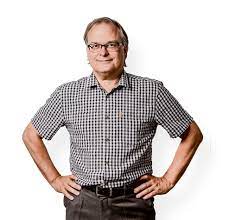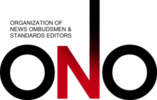
We no longer make the newspaper ‘just for ourselves’
Journalists who want to defend democracy do not have to become activists, according to outgoing ombudsman Sjoerd de Jong.
30 December 2021
Reading time 6 minutes
It started as more good, brilliant, half-baked, bad or disastrous ideas are born in journalism: at the coffee machine. Eleven years ago, the newly-new Belgian editor-in-chief of NRC Handelsblad let it slip that he found it strange that this newspaper, after all the best in the Netherlands, did not have an ombudsman.
Perhaps that is precisely why, you could think cynically.
Previous experiments by NRC to make it more accountable to readers and other critics after the horrific murder of the ‘demonized’ politician Pim Fortuyn in 2002, had failed due to the unwillingness of editors or general lukewarmness in the newsroom.
But the comment planted a first seed in me. After all, you could already read in journalistic journals that accountability and transparency were ‘the new objectivity’ – so who knows. Not much later, the silver star was indeed pinned on my shirt. The ‘Internal Affairs Office’, as it was soon ironically called among reporters, had been opened.
After eleven years, the office is now closed again – at least for me. The institute will continue to exist at NRC, with an experienced successor starting the job in September.
That says something good about the state of Dutch journalism, not only at NRC, but at all media that now have an ombudsman or woman in the porter’s lodge (de Volkskrant, Trouw, De Limburger, the NPO). Their numbers have increased, so has their visibility. It is not without reason that the ombudsman function was mentioned appreciatively in the coalition agreement of the former Dutch government . Yes, maybe that was a neoliberal kiss of death, but it’s also somehow: cool!
Eleven years is also a great survival rate, I was told by an Australian colleague, fellow member of the International Association of Ombudsmen and Women, ONO. Yes, it exists and organizes annual conferences in calming locations where the approximately sixty members, from different countries such as Canada and Estonia to South Africa and Mexico, can exchange experiences, discuss professional ethics and cry together.
STOIC SHERIFF OR SAD BOA
Meanwhile, the word ‘survival’ also illustrates the cliché about ombudsman work. That’s the image of the ombudsman not as a stoic kind of sheriff, but rather as a pathetic boa [an unarmed street surveyor – sdj] who is expected to patrol the borders of journalistic virtue and to address trespassers, with at most a sharp pen in his holster: ‘Don’t forget about the right to reply, would you?’
In truth, my relationship with readers and complainants was usually one of constructive – and also mutual – criticism, sometimes firm. After all, the aim is not to tear down the newspaper, but to help make it better, both in terms of content and style.
So were the comments from editors and reporters, generally, from the “you were too mild”-sayers that wanted to get the volume (from someone else) up, to heartwarming reports of editorial anger over a crumpled Saturday paper with that f***ing column. Yes, there banging doors – certainly during the first years of the Flemish revolution at NRC – although they were always opened again, albeit sometimes with a dirty shoeprint on it.
Reason to stop now is a simple one. No conspiracy, not the result of complaints, crisis or conflict. Let alone intervention by Bill Gates who wants to place a (new) chip in my head. Instead, the current editor-in-chief asked me to do the job for another two years after he took office. That was fine by me.. You don’t want to find out that your time is up when your false teeth clatter on the keyboard.
A lot has changed in Dutch journalism that decade – mostly for the better. The willingness to be open to readers and to reflect on professional ethics has undeniably increased. The time of the sovereign wisdom that we make the newspaper “just for ourselves” is long gone. That saying created a good club feeling and expressed the aspirations and neede of a new generation of academically schooled journalists who wanted to pursue their own goals, and sometimes obsessions.
But even then it was never literally true. The newspaper has always been there for readers or, in the case of NRC Handelsblad, for democratic citizens who want to be reliably informed.
SOLID GROWTH
That journalism is now doing very well – at least much better than the internet prophets envisioned who, around the turn of the millennium, were gloating about the imminent end of “dead tree journalism” from the Gutenberg-era. Instead, NRC has been experiencing a steady, strong growth in readers, subscriptions and public profile.
That has been accompanied by significant changes in the newsroom. NRC has changed from a classic evening newspaper (joined in 2006 by a cheeky morning nephew who jumped cheerfully out of bed to see what would happen) into a full-time digital news organization that also makes a newspaper. Readers have become accustomed to paying for online journalism (thanks to Netflix and Spotify).
The newspaper has also, for the most part, managed to free itself from the pressure (and grace) of a one-time daily deadline. NRC editors now also create podcasts and newsletters, they tweet and (in moderation, luckily) join talk shows. Also, there is the NRC Code, in which everyone can read how NRC wants to conduct journalism. Not a bookstore blockbuster, but still highly recommended.
Has the institution of ombudsman not outlived itself, then?
No, because with increased self-confidence, sometimes an unreflective arrogance also takes hold of ‘quality journalism’. On Twitter, journalists’ long toes sometimes reach right into your screen. The complaint that daily newspaper de Volkskrant has filed with the Dutch Press Council against a small opinion magazine, De Groene Amsterdammer (after a critical piece on the newspaper’s reporting), whoever you think is right, is a painful example of that touchiness.
Also, a would-be critical of even hostile attitude towards politicians and public officials, popular on social media, sometimes functions as a poor substitute for real hard-boiled journalistic investigation. Not every contradiction or inconsistency in a pile of documents is an instant-Watergate.
Also, growing transparency and more accountability do not mean that a newspaper has to surrender to all demands of ‘the market’, whether that of advertisers or of click-baiting readers. Haters of NRC on Twitter regularly sneer that the newspaper “totally depends on advertisers” to whom full lip-service is supposed to be paid. In reality, ads, once half of the newspaper’s revenue, now make up only about a fifth. It is not the advertiser who rules, but paying readers that matters.
CLIMATE PANIC AND WOKE SEKTARISM
So, more pressing is the question how a newspaper should address itself tot readers in an uncertain time of declining civic trust, right-wing-populism and political extremism, climate fear of even panic, gender identity disputes, woke sectarianism and other contemporary ideologies.
First of all, I would say: curious, focused and tenaciously inquisitive, rather than partisan. This is in keeping with a kind of civic journalism that sees journalism as a public service for democratic citizens. NRC Handelsblad has never been a newspaper that wanted to re-educate its readers, certainly not with an imported catechism. It wanted to become, at its foundation in 1970, a newspaper ‘for those who were willing to think for themselves’, instead of being admonished by doctrine or dogma.
That was a rather untimely starting point, back in a turbulent decade full of revolutionary aspirations. Yet it turned out to be a formula for success.
I think the lesson is this: journalistic engagement with a liberal democracy does not have to slide into activism that already fully knows how the world works (and manages to fit all the news into its own convictions). But civic journalism is not passive, on the contrary. It is a choice against extremism and against the false balance of regarding extremist views as “just another opinion”. Media that blindly pass on propaganda, end up being propagandists themselves.
NRC has learned that lesson the hard way, in the face of right-wing radicalism in Dutch politics and intellectual life, where an appeal to superior folk wisdom often obscures a worldview of extremist and hateful conspiracy theories.
But critical distance and investigation are also appropriate in dealing with other political and social movements that do not want their own moral clarity clouded by unwelcome opinions or facts.
Or by ‘incorrect’ language. Under the influence of left-wing activism, the media, including NRC, have become much more aware of the stigmatizing or racist power of words, social codes and structures.
But dealing with that in journalism is never merely a matter of using ‘correct’ language or having respect for personal, unimpeachable experiences. There’s also always a power struggle going on, real and imaginative, in the way a society – and journalism – views itself, its history and its future. That’s not something to be decided by grammar. Activist, left and right, hold competing worldviews that should all be critically examined, instead of smuggled in through linguistic or other codes.
In the polarized 1970s, NRC Handelsblad aspired to treat all ideology with skepticism, because reality does not fit nicely into any dogmatic tool-box.
But according to the Founding Principles the paper published back then, the suspicion of all ideology also went for the paper itself. “Watchfulness toward ourselves” was required, because “man” (the paper hated dogmas but did not shirk from big words) “is a creature of habit”. Yes, even NRC-men and women, apparently.
For exactly those reasons, you would want the newsroom of NRC Handelsblad not to be populated by purely like-minded souls, but by a mixture of progressives and conservatives, radicals and centrists. The newsroom has indeed become more diverse and inclusive. Rightly so, but not as an end in itself, I would say: it should enhance the scope and depth of its journalism.
And the ombudsman? Against that background, he is more of a creature of non-habits. Someone who not ony explains what ‘the rules’ are, but who also exposes gaps in reporting, identifies blind spots and points out creeping accommodation to societal or ideological norms – and questions them.
For a liberal and free-minded newspaper, no apparent standard should be absolute. Except that of unceasing, open-minded and truthful inquiry — and self-examination.
